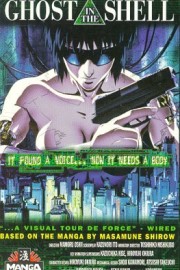Ghost in the Shell
Is it really much of a coincidence that, heading into the 21st Century, science fiction has taken a turn towards the apocalyptic not through painting aliens and viruses as the enemy but technology? I suppose we can blame Y2K for the idea, but sci-fi that looked at the dangers of artificial intelligence and robotics has been around for decades in the writing of Philip K. Dick, Issac Asimov, and others.
Watching Mamoru Oshii’s Anime masterpiece “Ghost in the Shell” again, however- in the week of “Terminator Salvation’s” release- it occurred to me just how much technology has played in so many doomsday scenario sci-fi flicks over the past 20 years, starting with James Cameron’s “Terminator” franchise and “The Matrix” trilogy. Oshii’s “Shell” franchise- which now includes a couple of sequels and a couple of TV shows (“Stand Alone Complex”)- based on the Manga by Masamune Shirow (which Steven Spielberg has optioned for producing live-action versions of), goes a step further than Cameron (and those who’ve followed him in the franchise) have.
In it, the world still has much in the way of an organic sense of life, as well as cars that drive on streets, as well as regular ammunition for guns. That said, certain technology has come a long way, with a lot of individuals now part organic being, part cybernetic machine. The body is merely a shell for many people, with a mind that can exist and communicate with others in the same way computer networks can connect with others. In Oshii’s world, the “soul” of an individual is called a ghost- part artificial memory, part organic memory.
We begin to follow Major Motoko Kusanagi and her team at Section 9- a Japan-based security team that deals with computer hackers. Kusanagi is one such cyborg, as is her partner Batou. They typically communicate through unspoken interfacing with one another on stakeouts. They’re in the process of locating a dangerous cyber-hacker known as the Puppet Master, who’s capable of altering the memories of certain “shells” to create an alternate reality for that shell, as one trash man finds out the hard way when he’s looking into his wife’s dealings during a divorce. Motoko is unusually interested in finding the Puppet Master, in hopes of diving into his/its’ ghost to figure out it’s purpose and motives. But the deeper down this rabbit hole they go, the more complicated questions of life/death/memory become for the characters and the audience.
Like most Anime, “Ghost in the Shell” gets more than a little complex- don’t be surprised if it takes you a couple times of watching it to fulling see the whole story. But unlike “The Matrix,” it actually has a lot to say about the nature of what it means to be human, especially in the cyber-age we live in now. In that respect, it has more in common with Alex Proyas’ more philosophical sci-fi thrillers (like “Dark City” and “I, Robot”) than either the Wachowski Sisters’ nonsense or Cameron’s original “Terminator” films, which used the man-vs.-machine paradigm to deliver action excitement more than probe the nature of humanity.
Don’t get me wrong, though- being Anime, “Ghost in the Shell” does deliver the goods in way of imaginative action and artistic vision. Fourteen years later, the film is still a high-water mark for such Anime that’s comparable to the works of Miyazaki and Satoshi Kon (“Perfect Blue”) in its’ look. If you were to do an Anime version of Ridley Scott’s “Blade Runner,” it’s hard not to think it wouldn’t look like this. Though the human world isn’t in decay yet, you can see the darkness starting in the stylish visuals of a future not far off the horizon. You can also hear it in the soundtrack by Kenji Kawai, which is ominous and exciting at the same time- the perfect musical accompaniment to a world giving itself up to a technology it doesn’t think it can live without. Considering the influence of technology in real life to what we see in films like “Ghost in the Shell,” how much longer before we’re so far down the rabbit hole that we can’t reign in our fascination with new technology, and that technology gets the better of us. I’m not saying it’d end up causing Judgement Day, but it’s not hard to see the start of things to come in this and other films.










